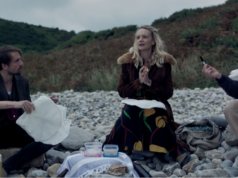Biographical films have grown wiser to the trap of presenting their subjects as saints who succeed because they’re touched by the divine. Even some Christian movies — not all but definitely some — have received the word that reckoning with their real-life subjects as flawed human beings is a better way of conveying their message, not to mention making for better entertainment. These days, a movie about a real person must at least pay lip service to that person’s imperfections. Unfortunately, lip service is about all that Bob Marley: One Love gives us, when it could have offered us so much more.
The film concentrates on a three-year span of Marley’s life, starting in 1976, when Bob (Kingsley Ben-Adir) is already rich and famous and planning on a concert in Jamaica that will unify a country on the brink of civil war. Some gunmen who aren’t prioritizing unity descend on his estate outside Kingston and shoot him, his wife Rita (Lashana Lynch), and his manager Don Taylor (Anthony Welsh).
Ben-Adir is a British actor who portrayed Malcolm X in One Night in Miami and one of the Kens in Barbie, which gives you an idea of his range. This is the first film that truly showcases him, and he seizes the opportunity. It’s a relatively simple matter to imitate Marley’s Jamaican accent and his rapturous dance moves onstage when he was in the music’s spell. Ben-Adir does more than that, especially in a scene when he’s creating “Exodus,” and you can see him listening to the sounds his backing musicians are making while singing a vocal line to fit what they’re doing. He also contributes a rare bit of humor, when he and his friends are arrested in London for walking while Black, and he tells the bobbies, “All the ganja is mine.”
I should note that Ben-Adir does not do the singing. Marley’s songs here have been re-recorded by his son, Stephen Marley, though Lynch is actually singing Rita Marley’s backing vocals.
Sitting in an auditorium with Marley’s hit songs coming through the speakers for 104 minutes can’t be a bad thing, and the film does conjure a truly remarkable scene late when Bob returns to his Jamaica home, fingers the bullet holes in the wall, and is surprised to see the man who shot him (Micheal Ward) standing in his living room again, this time begging for forgiveness. In a flashback, young Rita (Nia Ashi) introduces teenage Bob to Rastafarianism, and the movie goes over the barest-bones precepts for the audience members who think it’s all just dreadlocks and marijuana, so there’s that.
Rita does bitterly allude to the children Bob has had with other women, and we do see Bob savagely assault Don over his supposed skimming of the fees from Bob’s planned Africa tour, but these feel weirdly out of the flow of the movie, stuck in there for form’s sake or maybe left over from a much longer film that has been cut down. Bob Marley was hardly the only messenger of peace and love who struggled to put that into practice in his life, but some of Rita Marley’s memoirs make for chilling reading. Director/co-writer Reinaldo Marcus Green (who’s turning into a biopic guy with Joe Bell and King Richard) doesn’t grapple with the contradictions of the man whose music was so powerfully positive and who could be a terror to be around.
Marley’s family is intimately involved with the production of this film. That does hamstring the storytelling, but it doesn’t explain why the movie gives us so little sense of Marley’s place in the evolution of reggae from ska and rocksteady or how he managed his career to attain stardom or how his religious beliefs interfered with the treatment of the cancer that took his life. We’re left with Marley as some messianic figure who briefly alights on this earth. It’s credible as long as the music is playing or Ben-Adir is delivering Marley’s words about engendering peace. Too bad the rest of the film couldn’t achieve the same power.
Bob Marley: One Love
Starring Kingsley Ben-Adir and Lashana Lynch. Directed by Reinaldo Marcus Green. Written by Terence Winter, Frank E. Flowers, Zach Baylin, and Reinaldo Marcus Green. Rated PG-13.












